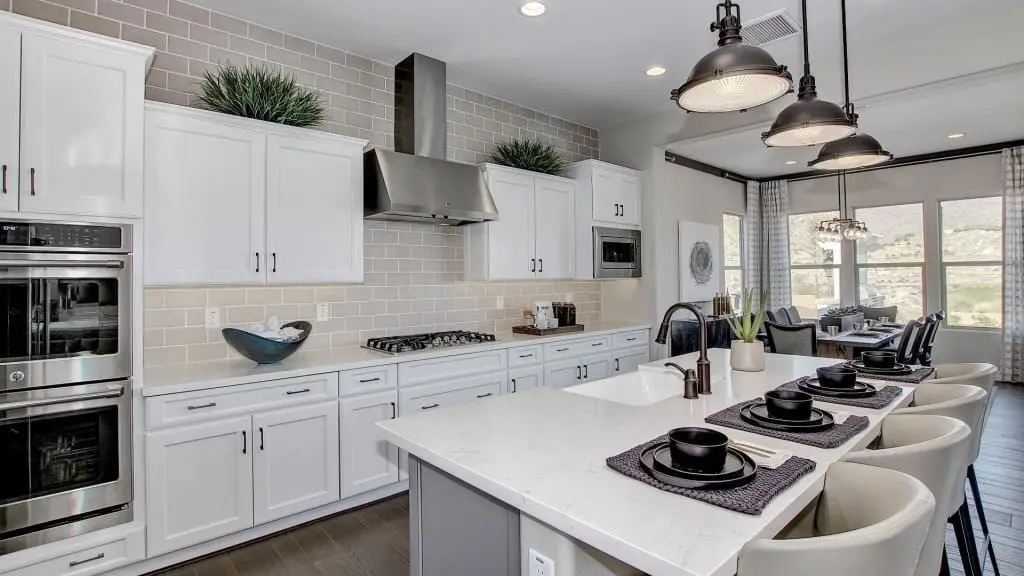
There’s so much to love about a new home, but one of the best things has to be brand-new kitchen appliances. If you’ve ever had a cruddy apartment or dealt with old, temperamental appliances, you know what I mean. Cooking and kitchen cleanup become so much easier and, dare I say, even enjoyable when you know your appliances are going to work without a fuss.
While it’s inevitable that appliances will need to be replaced at some point, you can extend their lives by simply taking care of them. Below, we share a few tips on how to maintain your kitchen appliances for longevity and performance.
Kitchen Appliances Maintenance Tips
Kitchen appliances are designed to operate on their own with very little input from us. In most cases, it’s a matter of pushing a button and letting it do its thing. That means there’s very little homeowners have to do on a day-to-day basis to keep their kitchen appliances running smoothly. In fact, appliance maintenance can be summed up with these three words: inspect, clean and maintain. Get to know your appliances so you recognize what’s normal operation and what’s not. Keep them clean and maintain them as needed.
A great way to learn more about your appliances is to read the manufacturer’s instruction booklet that came with each one. In fact, HomeServe, an independent provider of home repair service solutions, recommends reading the manual as its very first piece of advice on maintaining appliances:
“This manual usually contains helpful information and best practices for operating the appliance and will direct you as to how to use it properly. This will aid in avoiding overworking or breakdowns.” These booklets usually contain a care and maintenance schedule along with a troubleshooting guide to help you diagnose and fix problems yourself before calling in a repairperson. I like to keep all of my booklets in one place so I can easily find whatever I need when an issue crops up.
Refrigerators and Freezers
Refrigerators and freezers are a perfect example of a “plug it in and forget about it” appliance, but that would be a mistake since neglect is a top cause of fridge and freezer failure. At a minimum, you’ll want to vacuum the unit’s compressor coils twice a year, more often if you have pets. Compressor coils are located at the back or bottom of the unit and are crucial to keeping the appliance cool. Dirty, dusty coils have trouble removing heat from inside the unit, making the appliance run more often, for longer periods of time, and run hotter in general. All of this can add up to early failure.
You’ll also want to check the rubber gaskets on your fridge and freezer doors. These seal the unit closed, keeping the cold inside where it belongs. Dirty gaskets can seal poorly, allowing cold air to escape and forcing the appliance to run more frequently to keep the temperature stable. Simply wipe off any food and debris with soapy water, and then dry the gaskets off with a towel. Finally, don’t overfill your appliance. This blocks airflow and, again, causes the unit to run hotter than desirable.
Microwaves
The microwave is one of my least favorite appliances to clean. It’s a small space, tough to get into, and there always seem to be splatters of who knows what caked on inside. But regular cleaning is the single best way to prolong the life of microwaves, which last on average 10 years. Not only are caked-on food particles gross, they can eventually lead to electrical sparking if they are left too long and turn into carbon.
The easiest way to clean the microwave? Set a microwave safe bowl with water or white vinegar inside the appliance and turn it on until the liquid is boiling. At this point, the caked-on junk should wipe right off. If it’s still stuck on, repeat the process, but let the steam works its magic for a few minutes before you open the door.
Stoves/Ovens/Ranges
Electric and gas stoves both work best when they are clean of food build up. Keep exposed electric coils clean and clear debris from gas burners. Use a toothbrush to loosen debris that does not wipe up easily. Glass-topped ranges can be kept clean with glass cleaner or specialty cleaners.
For the oven, you can use a spray-on oven cleaner or get in there and scrub it down with baking soda and vinegar, but many ovens have a self-cleaning feature—don’t be afraid to use it! The oven will attain a very high heat, essentially burning off any caked on food inside. Afterward, all you have to do is clean up the crumbs!
And don’t forget to look up. Dan Montgomery, an advanced diagnostic specialist for Sears Home Services, reminds us to clean the vent hood:
“Cleaning the vent hood filter above the range will help in keeping a buildup of grease from the area around the range and the range’s cooktop, which will make it easier to keep the range clean.”
Dishwashers
Dishwasher maintenance is also all about keeping the appliance clean, sealed and free of debris. Even if you have a countertop dishwasher, taking care of this crucial appliance saves you money and time. Pay particular attention to the door gaskets and the bottom edge of the door. You’ll want to keep these areas clean and free of debris to prevent leaks. Wipe it down every so often with a water and bleach solution to keep it clean. While you’re at it, check the pump area and spray arms in the bottom of the machine. These areas can get clogged with bits of food, which prevents the unit from draining and can also make it harder for the dishwasher to get dishes totally clean.
Maintenance and Service Plans Offer Added Protections
I sometimes think kitchen appliances are underappreciated by homeowners. We use them every day but tend to take them for granted until they stop working or start to make a funny noise. When that happens, a bit of panic can set in: “Where do I get a repairman?” “How soon can he get here?” “Can it be fixed or do I have to replace it?”
Panic is completely understandable. Not only are appliance repairs inconvenient, always seeming to crop up at the worst times, they can be costly, too. Even having a technician come out to diagnose the problem will cost you, and that doesn’t take into account the actual repairs, which include any replacement parts (or a new appliance) and labor.
Protect yourself from these types of situations by taking care of your appliances, using them properly and keeping them clean. If the thought of unexpected breakdowns and repairs really bothers you, purchase a service agreement and say yes to the extended builder warranty for added peace of mind.

Liyya Hassanali is a Project Manager and Content Strategist for Kinship Design Marketing, a boutique agency that provides marketing strategies and content for architects, interior designers, and landscape designers. She is a 15+ year veteran of the marketing and advertising industry, working closely with her clients to provide written content that meets their marketing goals and gets results.
Liyya is passionate about home design and décor and is a confessed HGTV and Pinterest addict. When not providing content writing services for her clients, she can be found browsing home décor sites or spending time with her family.
 10 Bathroom Design Trends You’ll Want to Follow
10 Bathroom Design Trends You’ll Want to Follow